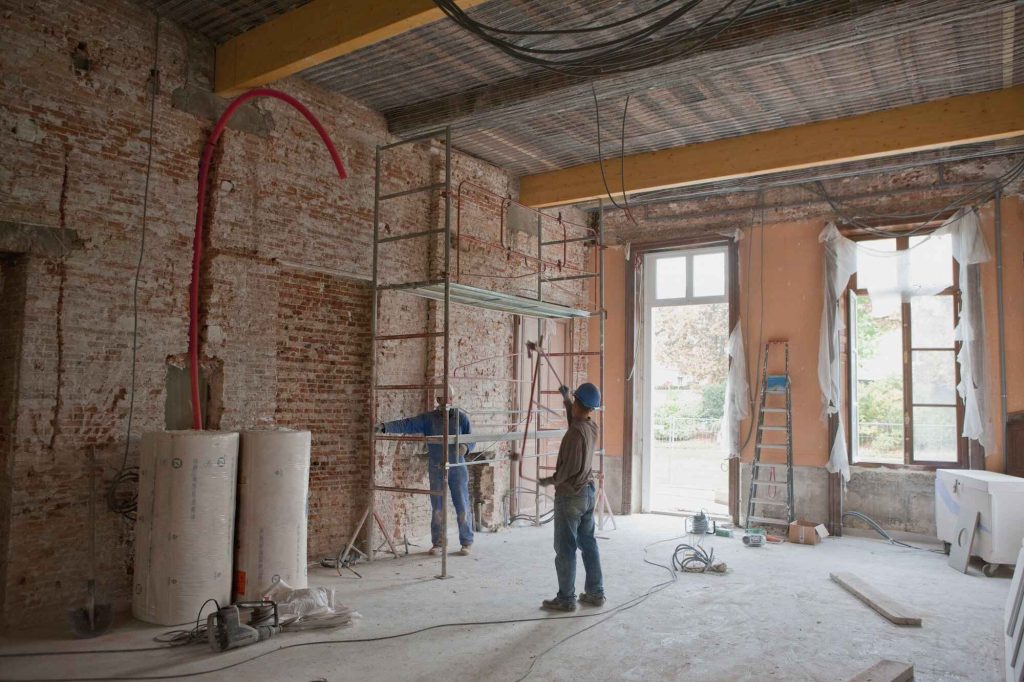If you plan to renovate or demolish a commercial property in Colorado, state law requires you to determine whether asbestos is present before starting any work. The Colorado Department of Public Health and Environment (CDPHE) regulates asbestos handling, removal, and disposal under Colorado Air Quality Control Commission Regulation 8, Part B. These rules protect workers, the public, and the environment from the release of harmful asbestos fibers.
For commercial property owners and facility managers, asbestos management isn’t just about passing inspection; it’s about protecting your building’s reputation, value, and people.
Why Asbestos Is a Serious Concern
Asbestos was once prized for its fire resistance and durability, but we now know it poses serious health hazards. When asbestos-containing materials are disturbed, they release microscopic fibers into the air. Inhaling these fibers can cause irreversible diseases, including:
- Asbestosis — a chronic, scarring lung condition that reduces breathing capacity
- Lung cancer — caused by prolonged asbestos exposure, often decades after contact
- Mesothelioma — a rare but aggressive cancer that affects the lining of the lungs or abdomen
Even limited or short-term exposure can increase risk, especially in enclosed spaces like offices, schools, and industrial facilities. For commercial property owners, this means asbestos isn’t just a regulatory issue — it’s a serious liability concern.
If asbestos fibers are released during renovation, routine maintenance, or demolition, everyone in the building — employees, tenants, customers, and contractors — can be affected. Beyond potential health claims, businesses may face building closures, costly remediation, and substantial fines for regulatory violations.
When an Asbestos Inspection Is Required
All buildings, regardless of age, may contain asbestos. Before any renovation or demolition, the materials that will be disturbed must be inspected for asbestos by a Colorado-certified Asbestos Building Inspector if the area to be affected exceeds the state’s “trigger levels”:
- 260 linear feet on pipes
- 160 square feet on other surfaces
- Volume equivalent of one 55-gallon drum
If these thresholds are met or exceeded, an asbestos inspection and report are mandatory.
The only exception applies if the building (or the specific area affected) was constructed after October 12, 1988, and the project’s architect, engineer, or certified asbestos inspector completes the official CDPHE form verifying that no asbestos-containing materials (ACM) were used during construction or any subsequent renovations.
Asbestos Abatement Requirements
If asbestos-containing materials that are friable—or will become friable—exceed the trigger levels, removal must be performed by a Colorado-certified General Abatement Contractor (GAC).
The GAC must:
- Submit an Asbestos Abatement Notification and Permit Application to CDPHE
- Pay the required permit fee
- Observe the 10-working-day notification period before work begins (unless emergency approval is granted)
- All asbestos waste must be disposed of at an approved asbestos waste disposal site, regardless of the amount.
Demolition Regulations
Demolition is defined broadly under CDPHE rules and includes any act of wrecking, dismantling, burning, imploding, or otherwise taking down a structure or load-bearing component.
Before demolition:
- A certified inspector must conduct an asbestos inspection.
- If asbestos is found above trigger levels, it must be abated prior to demolition.
- Even if no asbestos is found, you must submit a Demolition Notification Application to CDPHE and pay the associated fee.
- A 10-working-day notification period applies before demolition can begin.
During demolition, you must avoid rendering non-friable materials friable. For instance, you cannot crush or grind floor tile or roofing materials that contain asbestos. Recycling of asbestos-contaminated materials is prohibited.
Renovation Regulations
Renovation covers any modification, repair, or replacement work on a building’s structure or systems. If renovation activities will disturb asbestos-containing materials—especially those that are or may become friable—the project may require abatement.
Non-friable materials that will not become friable can sometimes be removed by other contractors, but all work must still comply with Regulation 8, Part B and OSHA standards.
A 10-working-day notification to CDPHE is required for regulated abatement work, along with the appropriate permit and fee.
Who Can Perform Asbestos Work in Colorado
Only state-certified individuals and companies may perform regulated asbestos work. These include:
- Certified Asbestos Building Inspectors
- Certified General Abatement Contractors (like us!)
- Accredited asbestos laboratories
- Registered asbestos consulting firms
Workers and supervisors must hold valid CDPHE-issued certifications and complete approved training courses and exams.
At Mile High Environmental Services, we are a Denver-based abatement contractor. Our service area includes Boulder, Pueblo, and more.
Disposal and Recordkeeping
All asbestos-containing waste must be disposed of at a CDPHE-approved landfill. Documentation of inspections, notifications, and disposal manifests must be maintained as proof of compliance.
Why Compliance Matters
Failure to follow the CDPHE regulations can result in serious fines — up to $25,000 per day per violation — and potential criminal penalties. Failing to address asbestos properly can also delay occupancy permits, sales, or refinancing for commercial properties.
Beyond compliance, proper asbestos management safeguards workers, occupants, and the public from long-term health risks. Tenants and employees expect a safe environment, while insurance companies and lenders often require proof of asbestos compliance.
A proactive inspection and abatement plan keeps your property safe, compliant, and operational, minimizing both health risks and legal exposure.
Partner With a Certified Colorado Asbestos Abatement Contractor
Our team provides certified asbestos abatement and disposal services across Colorado. We handle all CDPHE notifications, permitting, and safe removal to keep your project compliant from start to finish.
Contact us today to schedule an asbestos inspection or abatement consultation before you begin your next renovation or demolition.
Schedule your asbestos survey today and protect your property, your people, and your peace of mind.


